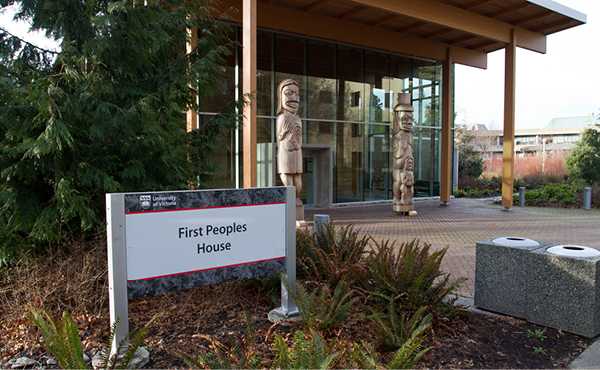CIRCLE’s “Stand Up for Mauna Kea” comedy night brings light-hearted tone to raise money for serious cause

Laughter is a great unifier, and one of the best natural ways of fostering human connection. Earlier this month, one UVic group used the power of laughter to help protesters thousands of kilometres away.
The Centre for Indigenous Research and Community-Led Engagement (CIRCLE) hosted a comedy night on Sept. 12, inviting Indigenous and non-Indigenous comics to perform at the “Stand Up for Mauna Kea” fundraiser.
Over 100 people filled both stands of the First Peoples House, and following an introductory video highlighting a group chanting and protesting atop Mauna Kea, Indigenous Studies Program Director Lisa Kahaleole Hall began the night with a speech detailing the backstory behind the Hawaiian protest.
“This is a moment of incredible cultural resurgence for Hawaiians,” said Hall, who recently visited protesters at Mauna Kea. “It is an unprecedented movement — I wanted to show that video partly so you could see and hear the beauty of the people, but you can see how many sectors of the Hawaiian community and allies are there.”
After a four-year delay due to peaceful protests and legal complications, protesters — sometimes as many as 2 000 people — have gathered atop Mauna Kea on the Big Island of Hawai’i since July in response to the proposed construction of the controversial Thirty Meter Telescope (TMT) project.
Indigenous Hawaiians see the land atop Mauna Kea as sacred, rich with history, and believed to be an origin point of the first Hawaiians, while scientists see the 4 207-metre mountain as a prime location to peer into the vast crevasses of outer space.
Currently, there are already 12 telescopes on Mauna Kea, but native Hawaiians have dug in their heels to prevent another one from going up, especially a mega-telescope. The TMT, if completed, will be the largest telescope in the world.
Stand Up for Mauna Kea was the third time in as many years that CIRCLE has used comedy to fundraise for a specific cause, having hosted stand-up events in 2017 for Standing Rock and 2018 for Unist’ot’en.
“People do enjoy laughter, humour, and we found that humour becomes a nice unifier to bring people together, but it also [can be] used to address a very serious issue,” said Jeff Corntassel, an Associate Professor of Indigenous studies and Acting Director for CIRCLE.
“We found that this actually draws more people than if we were to advertise a panel on Mauna Kea. People want to laugh, and at the same time people want to support good causes, so it’s a nice melding of the two.”
Donations were collected for admission, and would go mostly towards the legal fees, or any other costs, for the Pu’uhonua o Pu’uhuluhulu — a group of Native Hawaiians protecting the land of Mauna Kea in Hawaii.
Pu’uhonua, Hall said in her opening speech, is a Hawaiian word that means “place of refuge.” For over 60 days, the non-violent group has been living atop Mauna Kea — a place known as a ‘territory of Gods’ to Indigenous Hawaiins — in defiance of a proposed telescope construction.
In 2018, Corntassel said, CIRCLE helped raise $3 800 to support the Unist’ot’en territory in their protest of a proposed pipeline in northern B.C.
In August, the Martlet reported that UVic received criticism for its ties to the TMT project.
Although UVic has no research contracts with TMT, several UVic researchers in astronomy and astrophysics have worked on specific technological aspects of the project.
UVic is also one of 20 Canadian universities associated with the Association of Canadian Universities for Research in Astronomy (ACURA), an organization that helps coordinate large-scale national astronomy and astrophysics projects.
ACURA is a founding member of the non-profit TMT Observatory Committee founded in 2009, but does not hold an ownership stake in the project. Once TMT is built, UVic researchers, along with others from ACURA member institutions, will have the potential to book time with the telescope for research purposes.
The university received tweets from students and members of faculty and an open letter demanding UVic take action against researchers who have worked on the TMT and cease involvement with the project unless it is relocated. In response, they posted a statement reaffirming their commitment to reconciliation.
“The University of Victoria is deeply committed to respect and reconciliation with Indigenous peoples, not only in Canada, but around the world,” said Vice President of Research Dr. Lisa Kalynchuk on behalf of UVic.
“The TMT project will provide enormous scientific benefits to astronomy research and support important advances in knowledge. However, these benefits should not be achieved without the engagement and support of the local Indigenous people.”
Despite the heat UVic has taken for their involvement with the project, Corntassel says it wasn’t difficult staging an event in support of Mauna Kea on the university grounds.
“From what I’ve seen, the university has been supportive of Kanaka Maoli (Native Hawaiians) struggles, and I don’t find it as awkward as it could be if there were some sort of direct involvement,” said Corntassel. “The people that have addressed this from a university standpoint have been pretty supportive, and so I find that reassuring.”
At the end of the day, Corntassel hopes the comedy fundraiser helped people learn about the issues Native Hawaiians are dealing with, and proves that laughter can be used as a way to innovate change towards serious issues.
“Usually undergirding any humorous message is something really serious,” he said. “This struggle is about our future as Indigenous peoples, and it impacts all of us. The Mauna Kea protectors are protecting their land and water by putting themselves on the land, I want people to understand the stakes are high and it’s about the future of Kanaka Maoli people.”






